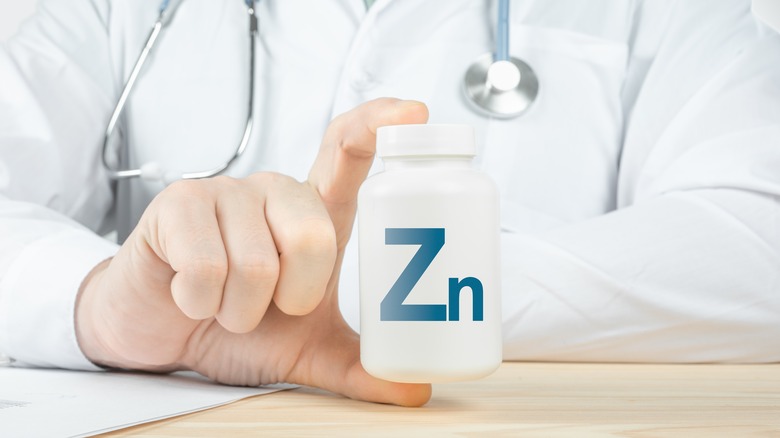Can You Take Zinc On An Empty Stomach?
Zinc is an essential nutrient, which means our bodies can't produce it or store it for very long (via Healthline). Because of this, it is necessary to get zinc through our diets or supplements. When taking a zinc supplement, it is recommended that you do not take it within an hour of eating in order to experience maximum absorption (via Livestrong). You should also avoid taking other supplements at the same time as taking zinc, because this can also potentially interfere with the absorption process. Iron, copper, and phosphorus have been shown to cause issues with zinc absorption and efficacy when they are taken at the same time.
However, taking zinc on an empty stomach may cause nausea and other types of gastrointestinal upset. Taking a slow-release formula may help. You can also start with a lower dose of the supplement and increase gradually as tolerated. Speak with your doctor if you need to take a zinc supplement but are having issues with nausea after taking it. They can help you find the best way to make sure you're getting enough zinc without feeling uncomfortable.
What is zinc and why is it important?
Zinc is an essential mineral that our bodies need in small amounts to function properly. It's found in many different foods, including seafood, meat, poultry, dairy, nuts, and whole grains (via Mayo Clinic). Zinc plays a vital role in many important processes in the body, such as cell growth and division, DNA synthesis, wound healing, and immune function.
A zinc deficiency can lead to a number of health problems, such as an increased susceptibility to infections, delayed wound healing, and poor appetite (via Healthline). While most people get enough zinc from their diet, certain groups of people are at risk for a zinc deficiency. These groups include vegans and vegetarians, pregnant women, people with chronic illnesses, and those who have undergone surgery. Zinc supplements are generally considered safe when used as directed, but taking too much zinc can cause side effects such as diarrhea, nausea, and vomiting. If you're considering taking a zinc supplement, speak to your healthcare provider first to ensure it's right for you.


